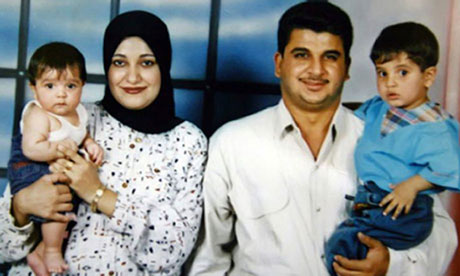Baha Mousa: guilty verdict on doctor should force an inquiry into Iraq abuse
It was left to a medical body to censure Derek Keilloh. That no one else has been brought to book over the killing is shameful

'The high court will examine the claim that hundreds of abuses, many similar to those suffered by Baha Mousa (pictured with his family), were inflicted by British troops on Iraqi civilians.' Photograph: Enterprise News and Pictures
The news that Dr Derek Keilloh has been found guilty by a medical tribunal of "misleading and dishonest conduct" is shocking. That a doctor, committed to the Hippocratic oath, should fail to adequately safeguard the wellbeing of his patients (in this case Iraqi detainees) and to report what he saw, is an affront to the medical profession.
But what is more shocking is that it should take a professional body to show the rest of the legal establishment that those involved in Baha Mousa's killing in 2003 should and can be held responsible for their actions. All the essential facts before the Medical Practitioners Tribunal Service (part of the General Medical Council) which heard Keilloh's case, were available from as early as 2004. It was known that Keilloh's claim not to have noticed any injuries to Mousa other than "dried blood around his nose" during his attempts to resuscitate him lacked credibility. It was known, too, that he had not taken adequate measures to check the health of the other detainees. And yet Keilloh has never been prosecuted for this alleged neglect of duty.
What's more, despite the Mousa inquiry delivering its conclusions over 15 months ago, not one of the dozens of other officers and men from 1st Battalion Queen's Lancashire Regiment, identified as either committing acts of unprovoked violence against Mousa (and the nine detainees held with him) or seriously failing in their duties, have since been brought to book. Sir William Gage, the inquiry's chairman, found that 18 soldiers had abused their prisoners. He noted, too, the failure of a succession of officers, including the commanding officer, Colonel Jorge Mendonca, and the second in command, Major Süss-Francksen, to ensure that Iraqi detainees were properly treated.
Even the padre, Father Peter Madden, was criticised in Gage's report for his alleged failure to blow the whistle on the abuse. Only one man,Corporal Donald Payne, has been punished for crimes associated with Mousa's injuries. No one has been made accountable for his death. That a public inquiry can reach such damning conclusions and yet no criminal action follows is mystifying.
This is perhaps the greater shame that the finding against Keilloh exposes. It demonstrates the impotence of the law and the indifference of government when it comes to addressing alleged crimes committed in Iraq.
There remains, though, an opportunity to redress this failing. Early next year, the high court will examine the claim that hundreds of abuses, many similar to those suffered by Mousa and his fellow detainees, were inflicted by British troops on Iraqi civilians between 2003 and 2008. In the case of Ali Zaki Mousa it must consider whether to declare as unlawful the government's refusal to order a public inquiry into alleged systemic abuses committed by British army personnel in south-east Iraq.
The time is surely ripe for this to happen. The "stain on the British army" that General Sir Michael Jackson (the chief of the general staff from 2003 to 2006) said the Mousa affair represented, will remain unless and until these allegations are fully uncovered and appropriate action is taken. The General Medical Council's finding against Keilloh should shame the government to take action before any order of the courts is made.
No comments:
Post a Comment